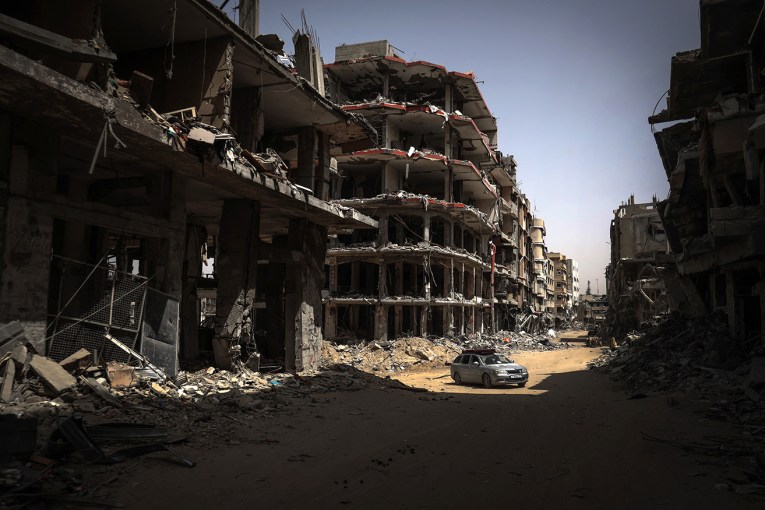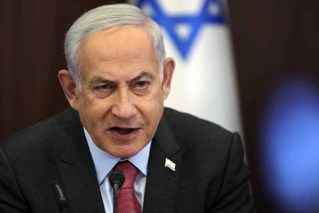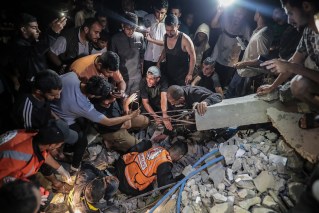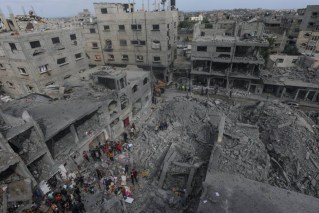‘Ready for all possibilities’: Hezbollah leader warns of possible wider war
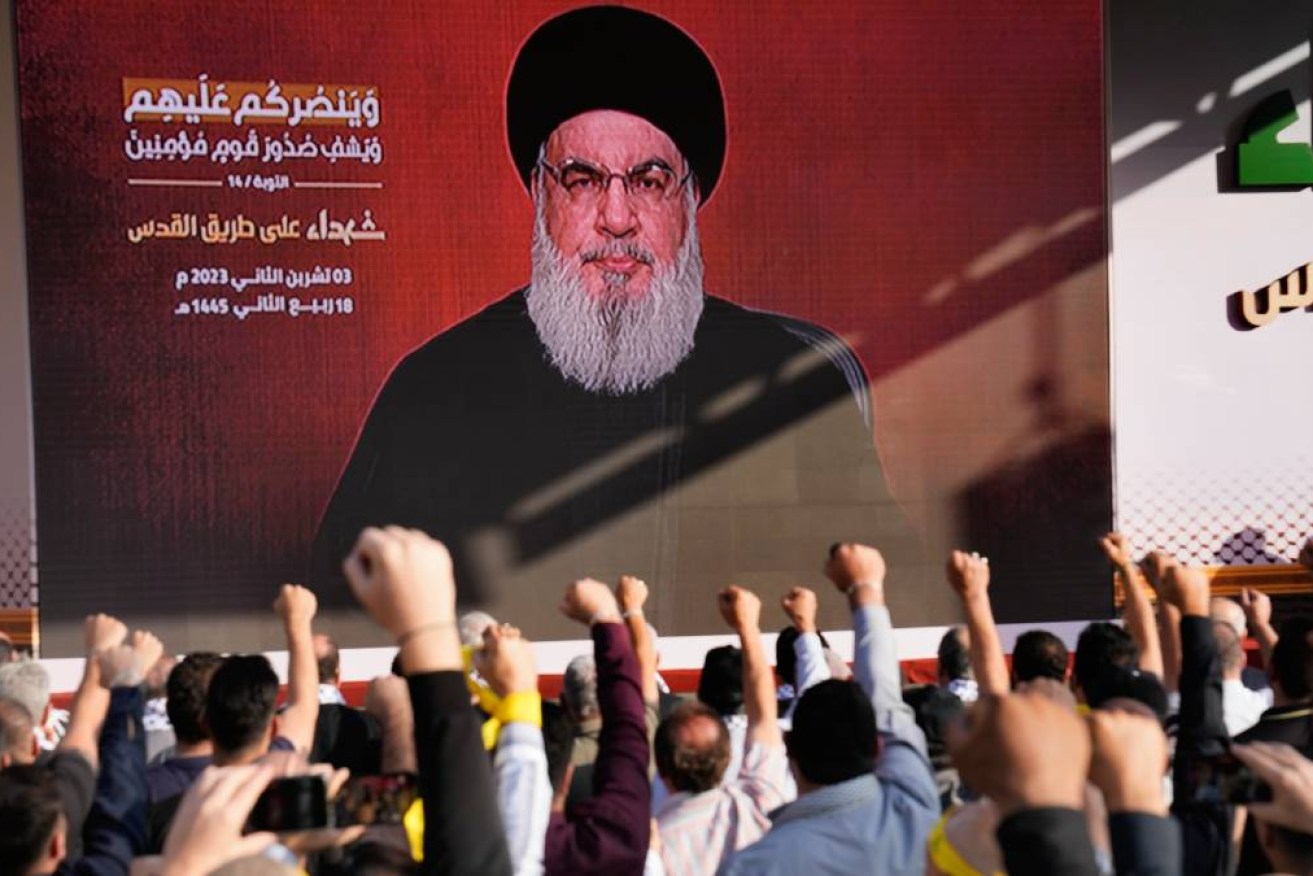
Sayyed Hassan Nasrallah has warned a wider conflict in the Middle East is a realistic possibility. Photo: AAP
Hezbollah leader Sayyed Hassan Nasrallah has given a televised speech, saying his Lebanon-based organisation is “ready for all possibilities”.
The leader of Lebanon’s Hezbollah has warned the United States that if Israel does not stop its assault on Gaza, fighting on the Lebanese front could turn into a wider war.
A strong military force backed by Iran, Hezbollah has been engaging Israeli forces along the Lebanon-Israel border in the deadliest escalation since it fought a war with Israel in 2006.
“We are ready for all possibilities,” Hezbollah leader Sayyed Hassan Nasrallah said in a televised speech, speaking for the first time since the Israel-Hamas war erupted.
He blamed the United States for the war in Gaza and the high civilian death toll and said a de-escalation in the besieged enclave was vital to prevent regional war.
“You, the Americans, can stop the aggression against Gaza because it is your aggression. Whoever wants to prevent a regional war, and I am talking to the Americans, must quickly halt the aggression on Gaza,” Nasrallah said.
He added Hezbollah did not fear the US naval firepower assembled in the region since the crisis erupted.
Tweet from @AJEnglish
Nasrallah said that further escalation along the Lebanese border between Israel and his group – a Hamas ally – was contingent on what happened in the Gaza Strip, under assault by Israeli forces since a deadly Hamas attack on Israel on October 7.
Nasrallah predicted Israel’s defeat in the war, and condemned Israel’s “extremist, foolish, stupid and brutal government”.
He sent his condolences to the families of those killed in the conflict, as well as his congratulations, saying that the dead would reach “paradise”.
The attacks on October 7 represented “a new historical phase of the conflict with the enemy,” he said.
The attacks killed more than 1400 people, the majority civilians, in Israel.
Nasrallah’s remarks coincided with a visit to Israel by US Secretary of State Antony Blinken, who said the US had been clear that it is determined there should not be a second or third front in the conflict.
Blinken was speaking to reporters in Tel Aviv following meetings with Israeli leaders, adding that the US is committed to deterring aggression from any party.
He also appealed to Israel to take steps to protect civilians in Gaza as its forces kept up their bombardment of the Palestinian enclave and the death toll among residents soared.
The Israeli military said its troops were fighting Hamas militants in close-quarter combat in the ruined streets after encircling Gaza City in their bid to wipe out the Islamist group that controls the small, densely populated territory.
Ambulance convoy hit
Palestinian health authorities in Hamas-controlled Gaza say Israel has struck a convoy of ambulances that was to leave al-Shifa Hospital in Gaza City and head to the south of the enclave to relocate injured people.
A representative for the Israeli military said it was looking into the report.
“The occupation targeted the convoy in more than one location outside the door of al-Shifa Hospital,” Ashraf al-Qidra, the ministry spokesman, said.
He said the convoy was targeted both at the hospital gate and at Ansar Square a kilometre away.
Qidra did not give a figure for casualties in the incident.
Hamas-run Al-Aqsa television cited the Health Ministry as saying scores of people were killed and injured.
Hamas-run Al-Shehab television said several people were killed and injured.
Earlier on Friday, Qidra said ambulances would send critically injured Palestinians who urgently needed care in Egypt from besieged Gaza City to the south of the enclave.
Israel, which has accused Hamas of concealing command centres and tunnel entrances in al-Shifa hospital, ordered all civilians to leave the north of Gaza last month and its military encircled the area on Thursday.
Hamas and al-Shifa hospital authorities have denied the facility is used as a base by militant fighters.
Video shared on social media, which Reuters has verified, showed people lying in blood next to an ambulance with flashing lights on a city street as people rushed to help.
Evacuated Australians
Two dozen Australians who were able to leave Gaza will start arriving home with help from the government but more remain trapped in the besieged strip.
Australians who have been allowed to leave war-torn Gaza will soon start arriving home after safely escaping into Egypt.
There are now 25 Australians, permanent residents and their family members who have been allowed through the Rafah crossing and since made their way to Cairo.
Australian consular officials met them on the other side and organised accommodation and commercial flights home free of charge.
The Gaza border authority releases a daily list of approved foreign nationals who can leave the besieged strip but Australians have only appeared in the first iteration with none nominated on the second and third day.
The first list included 34 Australians, permanent residents and their families.
Hundreds of international citizens have been able to cross into Egypt under a deal brokered between the US, Egypt, Israel and Qatar.
Australian officials are providing consular assistance to more than 60 people still in Gaza.
The Australian government was doing all it could to ensure those wanting to leave were able to safely, a Department of Foreign Affairs and Trade spokesman said.
The situation there is deteriorating as the effects of Israel’s blockade of supplies, including water and fuel, worsen.
Humanitarian aid is trickling in but not fast enough, international human rights bodies and the United Nations warn.
Australian Foreign Minister Penny Wong has also urgently called for extra aid.
Satellite images published in the New York Times reveal tens of thousands of buildings, at least a quarter of those in northern Gaza, had been damaged or destroyed after almost a month of Israeli strikes.
Seven United Nations special rapporteurs for human rights have expressed concern about the potential for genocide in Gaza and called for an immediate ceasefire.
“We remain convinced the Palestinian people are at grave risk of genocide,” they said in a statement.
Israel’s allies also bore some responsibility to help stop the attacks.
A number of buildings were destroyed during Israeli air strikes on the Bureij refugee camp.
The seven special rapporteurs added strikes against a refugee camp – which Tel Aviv said killed militants and a senior Hamas commander – were a war crime.
Cabinet Minister Ed Husic reiterated calls for a humanitarian ceasefire to allow aid to flow.
But he warned people to “be very careful about using words like genocide”.
“What we need to do is to de-escalate, to calm things down and to, in particular, help those that are innocent and have been deeply affected by those actions there in Gaza,” he said.
The international community continued to watch closely, he said, as he expressed concern for the number of children being killed.
“There has to be a much more strategic, precise way to hold Hamas to account,” he said.
—AAP with DPA
